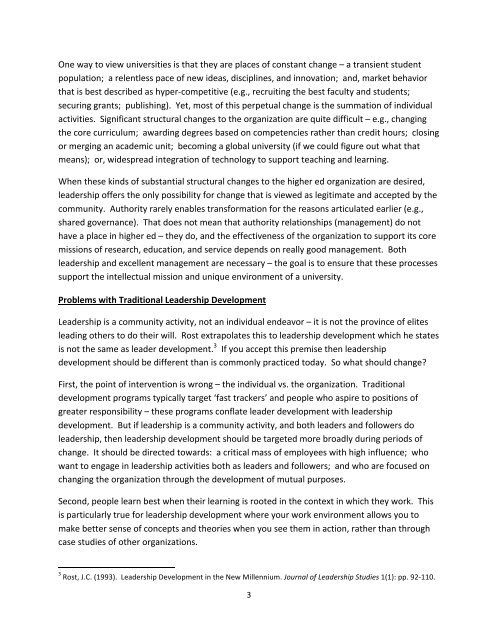Leadership Development in Support of Organizational Transformation
Leadership Development in Support of Organizational Transformation
Leadership Development in Support of Organizational Transformation
You also want an ePaper? Increase the reach of your titles
YUMPU automatically turns print PDFs into web optimized ePapers that Google loves.
One way to view universities is that they are places <strong>of</strong> constant change – a transient student <br />
population; a relentless pace <strong>of</strong> new ideas, discipl<strong>in</strong>es, and <strong>in</strong>novation; and, market behavior <br />
that is best described as hyper-‐competitive (e.g., recruit<strong>in</strong>g the best faculty and students; <br />
secur<strong>in</strong>g grants; publish<strong>in</strong>g). Yet, most <strong>of</strong> this perpetual change is the summation <strong>of</strong> <strong>in</strong>dividual <br />
activities. Significant structural changes to the organization are quite difficult – e.g., chang<strong>in</strong>g <br />
the core curriculum; award<strong>in</strong>g degrees based on competencies rather than credit hours; clos<strong>in</strong>g <br />
or merg<strong>in</strong>g an academic unit; becom<strong>in</strong>g a global university (if we could figure out what that <br />
means); or, widespread <strong>in</strong>tegration <strong>of</strong> technology to support teach<strong>in</strong>g and learn<strong>in</strong>g. <br />
When these k<strong>in</strong>ds <strong>of</strong> substantial structural changes to the higher ed organization are desired, <br />
leadership <strong>of</strong>fers the only possibility for change that is viewed as legitimate and accepted by the <br />
community. Authority rarely enables transformation for the reasons articulated earlier (e.g., <br />
shared governance). That does not mean that authority relationships (management) do not <br />
have a place <strong>in</strong> higher ed – they do, and the effectiveness <strong>of</strong> the organization to support its core <br />
missions <strong>of</strong> research, education, and service depends on really good management. Both <br />
leadership and excellent management are necessary – the goal is to ensure that these processes <br />
support the <strong>in</strong>tellectual mission and unique environment <strong>of</strong> a university. <br />
Problems with Traditional <strong>Leadership</strong> <strong>Development</strong> <br />
<strong>Leadership</strong> is a community activity, not an <strong>in</strong>dividual endeavor – it is not the prov<strong>in</strong>ce <strong>of</strong> elites <br />
lead<strong>in</strong>g others to do their will. Rost extrapolates this to leadership development which he states <br />
is not the same as leader development. 3 If you accept this premise then leadership <br />
development should be different than is commonly practiced today. So what should change? <br />
First, the po<strong>in</strong>t <strong>of</strong> <strong>in</strong>tervention is wrong – the <strong>in</strong>dividual vs. the organization. Traditional <br />
development programs typically target ‘fast trackers’ and people who aspire to positions <strong>of</strong> <br />
greater responsibility – these programs conflate leader development with leadership <br />
development. But if leadership is a community activity, and both leaders and followers do <br />
leadership, then leadership development should be targeted more broadly dur<strong>in</strong>g periods <strong>of</strong> <br />
change. It should be directed towards: a critical mass <strong>of</strong> employees with high <strong>in</strong>fluence; who <br />
want to engage <strong>in</strong> leadership activities both as leaders and followers; and who are focused on <br />
chang<strong>in</strong>g the organization through the development <strong>of</strong> mutual purposes. <br />
Second, people learn best when their learn<strong>in</strong>g is rooted <strong>in</strong> the context <strong>in</strong> which they work. This <br />
is particularly true for leadership development where your work environment allows you to <br />
make better sense <strong>of</strong> concepts and theories when you see them <strong>in</strong> action, rather than through <br />
case studies <strong>of</strong> other organizations. <br />
3 Rost, J.C. (1993). <strong>Leadership</strong> <strong>Development</strong> <strong>in</strong> the New Millennium. Journal <strong>of</strong> <strong>Leadership</strong> Studies 1(1): pp. 92-‐110. <br />
3


